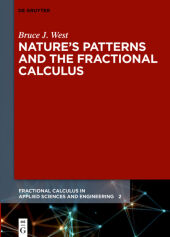 Neuerscheinungen 2017Stand: 2020-02-01 |
Schnellsuche
ISBN/Stichwort/Autor
|
Herderstraße 10
10625 Berlin
Tel.: 030 315 714 16
Fax 030 315 714 14
info@buchspektrum.de |

Bruce J. West
Nature´s Patterns and the Fractional Calculus
2017. XIV, 199 S. 48 b/w and 8 col. ill. 240 mm
Verlag/Jahr: DE GRUYTER 2017
ISBN: 3-11-053411-8 (3110534118)
Neue ISBN: 978-3-11-053411-5 (9783110534115)
Preis und Lieferzeit: Bitte klicken
Complexity increases with increasing system size in everything from organisms to organizations. The nonlinear dependence of a system´s functionality on its size, by means of an allometry relation, is argued to be a consequence of their joint dependency on complexity (information). In turn, complexity is proven to be the source of allometry and to provide a new kind of force entailed by a system´s information gradient. Based on first principles, the scaling behavior of the probability density function is determined by the exact solution to a set of fractional differential equations. The resulting lowest order moments in system size and functionality gives rise to the empirical allometry relations. Taking examples from various topics in nature, the book is of interest to researchers in applied mathematics, as well as, investigators in the natural, social, physical and life sciences. ContentsComplexityEmpirical allometryStatistics, scaling and simulationAllometry theoriesStrange kineticsFractional probability calculus
Table of Content:
Chapter 1: Complexity Science
1.1 It started with physics
1.2 Complexity
1.3 Measures of size
1.4 Allometry heuristics
1.5 Overview
Chapter 2: Empirical Allometry
2.1 Living networks
2.2 Physical networks
2.3 Natural history
2.4 Sociology
2.5 Summary
Chapter 3 Statistics, Scaling and Simulation
3.1 Interpreting fluctuations
3.2 Phenomenological distributions
3.3 Are ARs universal?
3.4 Summary
Chapter 4: Models & Derivations of ARs
4.1 Optimization principles
4.2 Scaling and allometry
4.3 Stochastic differential equations
4.4 Fokker-Planck equations
4.5 Summary
Chapter 5: Complex and Strange Kinetics
5.1 Fractional thinking
5.2 Fractional rate equations
5.3 Fractional Poisson process
5.4 A closer look at complexity
5.5 Recapitulation
5.6 Appendix
Chapter 6: Fractional Probability Calculus
6.1 Fractional Fokker-Planck equation
6.2 Fully fractional phase space equations
6.3 Entropy entails allometry
6.4 Statistics of allometry parameters
6.5 Discussion and conclusions
6.6 Epilogue
Bruce J. West, US Army Research Office, Cary, US


